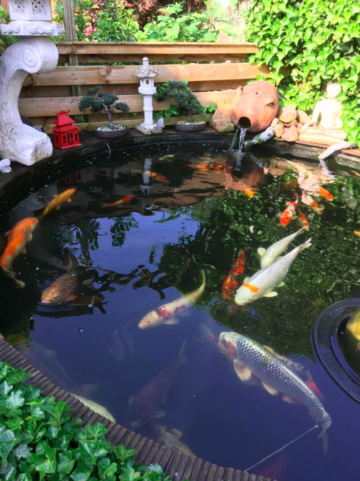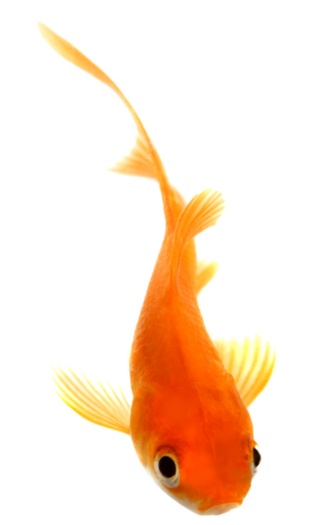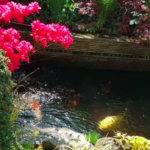Pond tips for the summer
The summer months are often the months when you enjoy your pond most. You spend more time in the garden during the nice weather. The pond also requires relatively little upkeep in the summer. It is important to follow the usual routines, and to keep an eye on a few things that we will explain in this blog.
Pond maintenance in the summer
As we have just said, relatively little pond upkeep is needed in the summer. June is the month when plants will grow very quickly indeed. Indeed, it is known as the ‘growth month’. If the pond starts to get overrun, it makes sense to thin out the pond plants. The lilies are also in full bloom in the summer. You should prune the water lilies that have finished flowering. That encourages them to flower. Cut back the floating plants and other water plants regularly so that there is open water. A handy tool for this job is the Duo Pond Tool, a combined cutting tool and grab! Ponds often turn green in the summer due to explosive algae growth. Algae grow faster when the weather gets better. Do you have problems with a green pond?
Keep an eye on the water lilies
Lily beetles can attack water lilies during the summer. The larvae of these beetles attack the leaves from the inside and the leaves will turn brown and die off quickly. The only solution is to prune and remove the affected leaves regularly. The sooner and more consistently you do that, the fewer problems you will have with lily beetles.
A lot of pollen and other dust gets blown into your pond in the summer. So you should keep the surface of the pond water clear with a dedicated tool like the Pond Skimmer. Make sure the KH value, or carbonate hardness, stays high enough during this period. That keeps the water crystal clear and prevents algae growth. The KH value determines the ‘acid neutralisation capacity’, which is important for the growth of oxygen plants. The KH value can be determined using special tests.
Prevent oxygen deficiency
The exuberant growth of aquatic plants can easily lead to an oxygen deficiency in the pond in the morning. That is because no oxygen is produced at night, even though the plants do continue to absorb oxygen. In addition, the temperature of the pond can rise to 20°C at this time. And warmer water contains less oxygen. In both cases, a pond pump or air pump can be the answer. Keeping the water moving with a pump of this kind can prevent a possible oxygen deficiency. The warm weather will also make algae grow faster. So you should clean the pump regularly and remove algae with a net.
Check the pond water
During this season, you should keep a close eye on water hardness and carbonate hardness. Test these values regularly and, if necessary, raise them with dedicated products such as GH Plus and/or KH Plus.
On hot days, a lot of water evaporates and your fish will have less space to swim in. So you should check the water level of your pond regularly and top it up if necessary.
Keep hungry herons at a distance 
There are also dangerous hunters in the summer months who enjoy a nice nibble. A hungry heron or an adventurous cat can be a particular threat in shallow ponds where the fish find it difficult to hide. Stay alert and protect your fish! This can be done in an animal-friendly way with a product like the Laser Guard, which scares off herons and cats effectively.
Fish grow very quickly
Because the water temperatures are higher, your fish will also be hungrier. So you can give them plenty of feed. Give them pre-soaked lettuce or a few earthworms from time to time. They love it!
The fish grow fast at this time, their colour pattern develops and they build up condition to get through the coming winter. So you should feed them more than usual. Make sure no feed is left over: that will result in more algae growth.
Here is an overview of all our tips for the summer months:
- • Make sure your pond doesn’t get completely clogged up by regularly pruning the pond plants and pruning lilies once they have stopped blooming.
- Make sure there is enough oxygen in the pond. This is very important on hot days in particular. If necessary, change 10% of the pond water every week or purchase a good pond aeration system.\
- Protect your fish against herons.
- Measure the water values every week.
- Feed your fish well and regularly to encourage growth and colour development.

